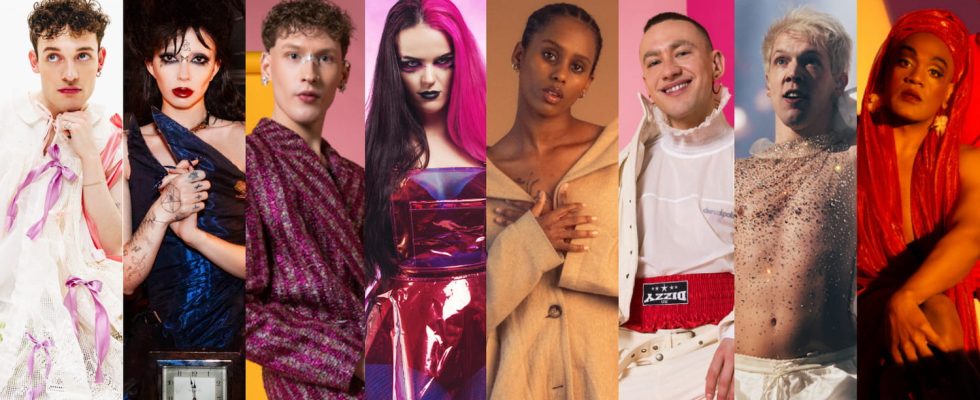Eurovision 2024 is marked by an almost record number of LGBT+ candidates, once again making the show a platform for diversity issues.
Eurovision was a kitsch and boring contest, it became cool. It smelled of mothballs, it is now an outpost of LGBT+ diversity. Like every year for around 10 years, the big European show, which is being held this Saturday, May 11 in Malmö, Sweden, will highlight numerous candidates from the LGBT, LGBTQ or LGBTQIA communities (lesbians, gays, bisexuals, trans, queer, intersex and asexual). Out of 37 candidates, 8 openly declare themselves members of the LGBT+ community, or 20% of artists.
This figure places the 2024 edition of Eurovision among the most representative of sexual and gender diversity, almost reaching the record of 2021, which included nine LGBT+ candidates. This year, the competition also sees the participation of two non-binary artists, a historic first. Enough to reinforce this particular status of Eurovision, which has become a reflection of the evolution of European societies on issues of diversity and inclusion, but also a privileged platform for queer visibility.
Two non-binary candidates
Among the highly anticipated artists, the Swiss artist Nemo is one of the notable figures of Eurovision 2024 with his song “The Code”, just like Bambie Thug, another non-binary who will perform “Doomsday Blue” for Ireland . One of the big favorites for Eurovision this year, Nemo Mettler (the Swiss’ real name), has affirmed his non-binary character in several interviews. Along with Bambie Thug, born Bambie Ray Robinson, they expressed the hope that their presence will allow recognition of non-binarity on the international stage and encourage others to accept their identity.
“Some non-binary artists have come out after participating in Eurovision, I believe. The fact that there are two of us this year shows that it’s time to talk about it. I hope it will encourage people to learn about what non-binarity is and that this will create discussions,” Nemo told 20 Minutes.
Other artists such as Zaachariaha Fielding and Michael Ross, the duo representing Australia, are also among the representatives of this diversity at Eurovision. Both artists are emblematic figures of the queer community in their country. Fielding in particular, who is of Aboriginal descent, is recognized for his performances as a drag queen. The same goes for the Belgian Mustii, the pseudonym of Thomas Mustin, singer, composer and director, who defines himself as queer and participated as a juror in the show Drag Race in the flat country.

The representative of Denmark, with the stage name Saba, will also be a special icon in this Eurovision song contest. As a black woman – she was adopted in Ethiopia at the age of eight months – and a lesbian, Anna Saba Lykke Oehlenschlægera, her real name, underlined before the show the importance of the symbol that she can represent for a number of young girls. She will share with Kenzy Loevett, the candidate from San Marin, the difficult task of making lesbians visible in the competition. The latter also publicly shared her personal journey, emphasizing the longevity of her relationship with her partner.
Silvester Belt, a Lithuanian singer in his twenties, was a revelation in his country ahead of Eurovision. So much so that questions about its sexual orientation have become a concern for some of its inhabitants. “If you need a label, you can say that I am bisexual,” he said quite simply during the pre-selections. A naturalness that left its mark in a country still hit by difficulties for LGBT+ people.
Finally, we can hardly talk about the queer artists of Eurovision 2024 without mentioning the Briton Olly Alexander, a great activist for LGBT+ rights in his country, author of several key testimonies on the mental health of young gays or on the promotion of safer sex . Author of the documentary “Grandir Gay” in 2017, he appeared on English television but also French recently, for his role in “It’s a sin”, broadcast on Canal+ in 2023 and on France 2 in mid-March. A series recounting the ravages of AIDS in the 1980s within the homosexual community.
Eurovision and LGBT+, a long history
The affinities between the LGBT+ community and Eurovision are not new. The organizers of the competition regularly emphasize that Eurovision aims to bring together a wide audience, regardless of sexual or gender identity. But some believe that a link already existed, hidden, from the 1950s-1960s, with the participation of homosexual artists in a certain ambiguity, like the lesbian singer Dany Dauberson, who represented France in 1956 The emphasis on diversity at Eurovision, first cultural and linguistic, then the surge of flamboyant disco music and staging, with its divas, will gradually turn the competition around from the beginning. 1970s and attracting gay fans in numbers.
“Coming out” took place little by little in the 1980s and 1990s, with an LGBT audience increasingly visible on television, the show being organized live and in public from 1998. It would also be visible on stage at the same time, Iceland’s Paul Oscar being the first openly gay contestant to enter the competition in 1997 and Israeli Dana International the first trans woman to win the competition the following year. Threatened with death by orthodox religious people, she will be a pivot in the transformation of Eurovision into a political forum.
Other artists will mark the competition like the Serbian Marija Serifovic in 2007, or the Finnish Krista Siegfrids, who will kiss one of her dancers at the end of her performance in 2013. But it is obviously the victory of the drag queen Austrian Conchita Wurst, in 2014, who will be the catalyst for all these movements. It was ten years ago and she dedicated her victory “to anyone who believes in a future of peace and freedom”. A message that has a particular resonance on the eve of Eurovision 2024.
